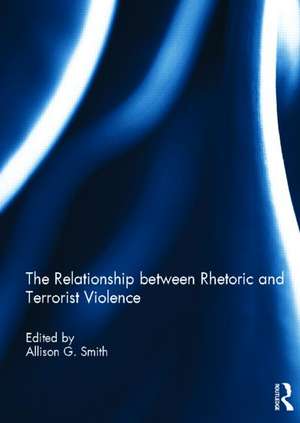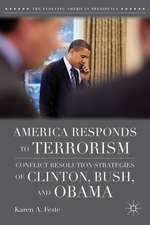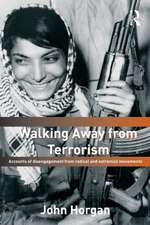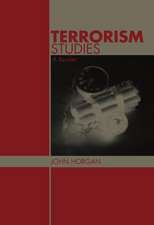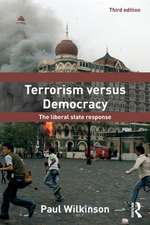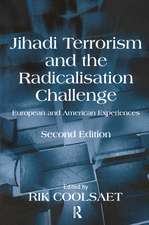The Relationship between Rhetoric and Terrorist Violence
Editat de Allison Smithen Limba Engleză Hardback – 22 mai 2013
This book was originally published as a Special Issue of Dynamics of Asymmetric Conflict.
Preț: 997.58 lei
Preț vechi: 1216.57 lei
-18% Nou
Puncte Express: 1496
Preț estimativ în valută:
190.92€ • 197.80$ • 159.33£
190.92€ • 197.80$ • 159.33£
Carte tipărită la comandă
Livrare economică 22 martie-05 aprilie
Preluare comenzi: 021 569.72.76
Specificații
ISBN-13: 9780415823609
ISBN-10: 0415823609
Pagini: 128
Dimensiuni: 174 x 246 x 13 mm
Greutate: 0.38 kg
Ediția:New.
Editura: Taylor & Francis
Colecția Routledge
Locul publicării:Oxford, United Kingdom
ISBN-10: 0415823609
Pagini: 128
Dimensiuni: 174 x 246 x 13 mm
Greutate: 0.38 kg
Ediția:New.
Editura: Taylor & Francis
Colecția Routledge
Locul publicării:Oxford, United Kingdom
Public țintă
Postgraduate, Professional, and UndergraduateCuprins
1. The relationship between rhetoric and terrorist violence: Introduction
2. Using computer analyses to identify language style and aggressive intent: The secret life of function words 3. Violent frames in action 4. The rhetoric of Islamic activism: A DICTION study 5. Leadership, terrorism, and the use of violence Margaret 6. Anticipating attacks from the operational codes of terrorist groups 7. Scoring motive imagery in documents from four Middle East opposition groups 8. The hidden implications of radical group rhetoric: Integrative complexity and terrorism 9. Scoring universal values in the study of terrorist groups and leaders 10. The terrorist rhetorical style and its consequences for understanding terrorist violence
2. Using computer analyses to identify language style and aggressive intent: The secret life of function words 3. Violent frames in action 4. The rhetoric of Islamic activism: A DICTION study 5. Leadership, terrorism, and the use of violence Margaret 6. Anticipating attacks from the operational codes of terrorist groups 7. Scoring motive imagery in documents from four Middle East opposition groups 8. The hidden implications of radical group rhetoric: Integrative complexity and terrorism 9. Scoring universal values in the study of terrorist groups and leaders 10. The terrorist rhetorical style and its consequences for understanding terrorist violence
Descriere
This book presents findings from a research effort funded by the U.S. Department of Homeland Security’s Science and Technology Directorate, which examined whether linguistic content analysis can indicate whether groups will engage in terrorist violence.
